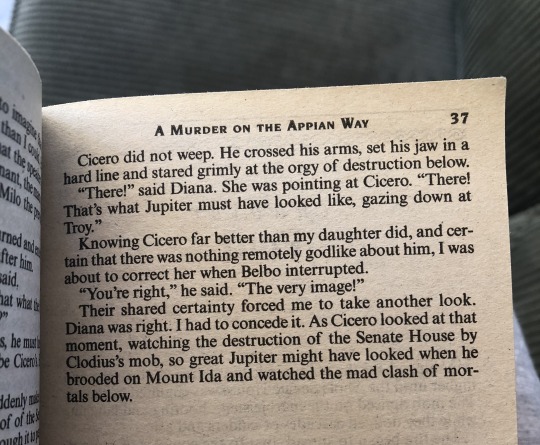#now with illustrations from my old snapchat history oops
Note
Do you know the Roma sub Rosa series by Steven saylor? If yes, what do you think of the Cicero description in it?
Hello anon!
I’m assuming this ask might be about the conspicuous absence of Steven Saylor’s Roma Sub Rosa from this post about Cicero fictions?
Yes, I’ve read most of the Steven Saylor novels and short stories, and though I’ve enjoyed aspects of them, I do confess I have a (few) bone(s) to pick with Saylor about how he depicts Cicero! More on this below the cut!
[Spoilers for all of Steven Saylor’s Roma Sub Rosa stories, but like, nothing that you wouldn’t also be spoiled for if you picked up a history book about this period.]
The important thing to know about Saylor, first and foremost, is that he actually set out to write a series of books about (and, indeed, from the perspective of) Cicero. But once he got around to the research stage, Saylor decided he didn’t actually like Cicero, and basically relegated him to being a side-character relative to the self-insert OC narrator “Gordianus,” whom Saylor created to be his new protagonist.
Now, I respect the fact that Saylor wanted to have a character that he could basically mold to his own whims – sometimes you don’t want to have to read thousands of words of Latin to get an accurate grasp of a real, complex historical figure just to be able to write in that person’s inner voice, you know? That’s valid. If (when) I write a Cicero novel, it’s not going to be from Cicero’s perspective. I also want the greater freedom of a lesser-known (or original) POV character.
That being said, I think that Saylor’s treatment of Cicero is ungenerous, unimaginative, short-sighted, petty, and mean – and that I don’t respect. Saylor’s Cicero is amoral, deeply lacking in compassion, and egotistic. The historical Cicero was obsessed with his own self-image, yes, but he cared very much about the people in his life. Saylor’s Cicero lacks many of the fundamental relationships that made the real Cicero who he was, like his love for his daughter and his passionate friendship with Atticus. Saylor’s Cicero is full of logical inconsistencies: in A Gladiator Only Dies Once (2005), Cicero is too squeamish to enjoy a gladiator show, but in The Throne of Caesar (2018), Cicero revels in Caesar’s death to the point that he was “giddy with joy.” (Historically, it’s reasonable to say that Cicero viewed the death of Caesar as a purely positive thing, but Saylor’s narrative clearly shames Cicero for this supposed bloodlust, which is not a take I find valid or compelling within the arc of this Cicero’s character.) Saylor’s Cicero exists only so that Saylor’s Gordianus has someone to consistently cringe at and morally judge.
I also think that Saylor leans too heavily into the idea that historical men are all misogynist and that the only way for a historical man to express enmity with a woman is to slander her with sexual invective. While the real Cicero had no compunctions about using sexual slander, he used the same types of sexual insults against both men (Clodius, Caesar, Antony) AND women (Clodia) and even then, he didn’t use these terms against all the women he disliked ; Cicero very much hated Cleopatra, but never used any sexual slurs against her – whereas Saylor has his Cicero call Cleopatra a “whore” for no apparent reason, in The Throne of Caesar (2018).
Ultimately, though, I think the worst injustice done to Cicero in Roma Sub Rosa is a narrative one: by ending his series with the death of Caesar, Saylor omits one of the pivotal moments of Cicero’s career: his final (and fatal) resistance to Marc Antony. The conclusion of Saylor’s series suggests that, after Caesar’s assassination, the story is simply done, and the world will soon settle gently into a new normal. In reality, the year following Caesar’s death represents a massive and violent sea-change, during which Cicero sacrificed his life in a vain – yet noble – attempt to preserve the republic against the machinations of those who would install an empire. It’s a tragic story of resistance to tyranny that has inspired revolutionaries for two thousand years, and Saylor simply doesn’t seem to care about this.
To counterbalance this laundry-list of disagreements, here’s is a more positive list: Three (3) Things I Like About Saylor’s Cicero
1. Every single Baby Gay™ in Saylor’s books is in love with Cicero, which gives us some incredible lines like this one, from Cicero’s intern, Rufus: “‘I didn’t kiss her for pleasure. I did it because I had to. I closed my eyes and thought of Cicero,’” from Roman Blood (1991).
(Note: Rufus also waxes rhapsodic about Cicero by quoting Sappho’s most famous queer poem, the Phainetai moi, in The House of the Vestals (1997) – cf. image below.)

2. Quite often, Saylor’s narrator has to witness everyone around him (including the members of his own family) hero-worshipping Cicero. I get a certain schadenfreude out of reading about this.

3. Every once in a while, Saylor will use his narrator to make prescient comments about the future (i.e. our present), and sometimes (sometimes) these comments are emotionally rewarding to a Cicero fan, like this speculation: “Who knows, perhaps all that survives the ravages of time will be scroll upon scroll of those long-winded speeches of Cicero’s, lovingly transcribed by Tiro – and ours will be known as the Age of Cicero, seen through his eyes alone,” from The Throne of Caesar (2018).
Overall, though, I more often find myself angry at how Saylor handles Cicero, rather than amused. I fundamentally don’t think he understands who Cicero was as a person, or what motivated him, or why anyone would care about him, now or then. That being said, I do appreciate that Saylor gives a good amount of character development to Tiro, Cicero’s enslaved (and later freedman) secretary; he’s one of my favorite characters in Saylor’s books, and one of my favorite historical figures, period.
Also, you know, there’s this:

I hope this answers your question – feel free ask more about Cicero, any time!
#now with illustrations from my old snapchat history oops#thanks for the ask anon!#anon ask#marcus tullius cicero#long post#roma sub rosa#classics#that change not with the changing of the years
24 notes
·
View notes